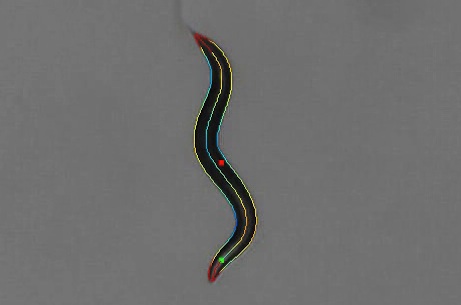
Eviatar Yemini is first author of a paper which provides the largest database so far of nematode worm phenotypes which could be a vital resource for neuroscience research.
Research led by a Gates Cambridge alumnus has identified behavioural functions for a huge range of genes which are a key resource for neuroscience research.
The research which is led by Eviatar Yemini [2007] and published in Nature Methods creates the largest current database of phenotypes for the nematode worm, C. elegans, a major experimental model for neuroscience, ageing and development.
Scientists have been able to sequence genomes for many experimental organisms like C. elegans, but a major challenge has been to attribute functions to the genes identified. The new research provides a method of phenotyping that is both high-throughput, so all an organism’s genes can be more rapidly phenotyped, and high-content, so inferences about gene function can be made with precision.
A key output of the nervous system is motor behaviour and a variety of neural disturbances can be seen as changes in motion. The researchers, led by Eviatar who is part of Bill Schafer’s group in the Laboratory of Molecular Biology’s Cell Biology Division at the University of Cambridge, developed methods for quantifying worm behavioural phenotypes and from this have generated the largest phenomic database for the nematode to date.
The research involved designing and building an array of automated tracking microscopes, and collecting over 10,000 short (15-minute) videos of freely-behaving worms. These videos were then segmented and processed to obtain a compressed representation of the worm’s posture and movements, and algorithms were devised to measure parameters relevant to locomotion and other known worm behaviours. The segmented movies, along with feature summaries and statistical comparisons to wild-type controls, have been organised into a unified database, which is publicly available here. This ever-increasing set of behavioural data will provide a key resource for future neuroscience research.
Eviatar says: “We created a resource to access in-depth experimental data for over 300 worm strains with both known and hypothesised nervous system mutations. The strains themselves are represented by over 10,000 experiments, but the paper covers just over 9,000. What this means is that if a researcher is interested in gene X, if we’ve profiled it they can access data all the way from a large-scale statistical summary of its phenotypic significance to the details of what a single worm with the mutation did over a 15-minute time period at 30Hz resolution (alongside single-worm controls). This level of publicly accessible detail has never been offered before.”
The three-year research involved over 1,000 wild-type worms (known as the strain N2) which share nearly identical genetics. With this data, the database allows scientists to look into questions of behavioural variability in practically identical worms. Eviatar says: “In other words one might approach the question, if I could live 1,000 lives in parallel would I live them all the same or is every incarnation slightly different and how so?”
The research was also sensitive enough to identify significant behavioural changes for 76 genes with no previously known phenotype, closing a phenotyping gap present in many other, less sensitive methods of profiling worms and their behaviour.
An MRC Centenary public participation project, Worm Watch Lab has also provided information that will be incorporated into the phenotypic database. This project uses crowdsourcing to analyse the collected video data to quantify egg-laying, a behaviour that currently cannot be measured as accurately by machine as by the human eye.












